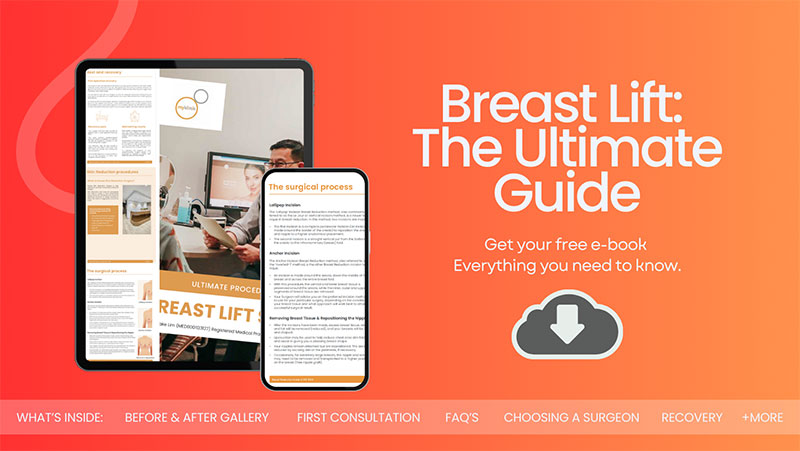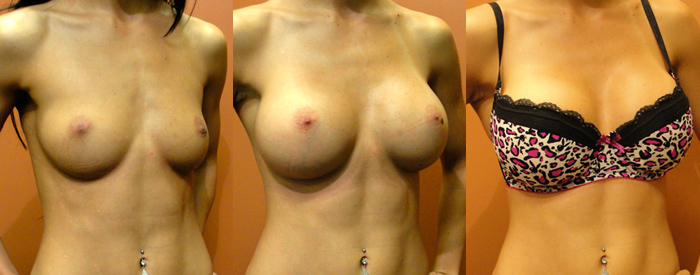Bra Cup Sizes and Breast Implant Sizes
It is only natural to wonder “What cup size will I be after breast implant surgery?” and it’s important to bring this up during the consultation with your plastic surgeon, before getting a breast augmentation.
Sydney Plastic Surgeon Dr Jake Lim is committed to helping his patients understand the implications of breast augmentation surgery to make informed decisions.
Dr Lim’s 2024 Breast Lift Guide

How Bra Sizing Works
In Australia, as in many places, bra sizes are denoted by a combination of a number and a letter. This alphanumeric label is not arbitrary; each part serves its purpose.
- The Number (Band Size): This number stands for the band size, reflecting the measurement taken around the rib cage, directly below the bust. It’s a crucial measurement because it ensures that the bra offers the foundational support you need. When taking the band size measurement, it’s important to make sure the tape measure sits evenly and fits snugly, laying flat across the back without squeezing too tightly
- The Letter (Cup Size): This letter indicates the cup size, which relates to the volume or fullness of the breast. To determine your cup size, you’ll measure around the bust at its fullest point and then subtract the band size from this figure. The resulting difference in centimetres guides you to a specific cup size. For instance, a difference of 2.5 cm might lead you to an A cup, 5 cm to a B cup, and so forth. There are online guides like https://www.calculator.net/bra-size-calculator.html that can assist with sizing
Even within Australia, it’s essential to be aware that bra sizes can slightly vary across different brands. Manufacturing differences, design specifics, or the materials used can impact how a bra fits. Therefore, always consulting the provided sizing chart when making a purchase or trying the bra on, if possible, is recommended.
Our bodies change over time, and so can our bra size. Factors like weight fluctuations, hormonal changes, or even certain exercises can affect breast size. Hence, periodically measuring yourself ensures you’re always wearing the most comfortable and supportive size.
Breast Implants in Australia – Size Matters
The choice to get breast implants is a personal one and can be influenced by various reasons, from cosmetic desires to medical necessities. Just like bras, breast implants also come in different sizes and types. The choice of size is integral not only to achieve the desired aesthetic outcome but also to ensure the physical comfort of the individual.

What Is Breast Implant Volume?
Breast implants are typically measured in cubic centimetres (cc). This measurement provides a consistent metric that plastic surgeons and patients can use to discuss size preferences and expectations.
- Small Implants: Ranging from 100cc to 250cc, these implants offer a modest enhancement to one’s natural breast size
- Medium Implants: These fall in the range of 250cc to 450cc and provide a noticeable, but not overly dramatic, increase
- Large Implants: Anything 450cc and above is considered large and offers a significant size increase
Implant Material Choices
There are primarily two types of breast implant materials available in Australia:
- Saline Implants: These implants are filled with sterile salt water (saline). If they were to rupture, the body would naturally absorb the saline without any harm
- Silicone Implants: These are filled with a silicone gel. They often feel more like natural breast tissue compared to saline implants
How Implant Sizes Relate to Bra Cup Sizes
The implant volume one might choose doesn’t translate directly to a specific bra cup size. Several factors come into play, such as the amount of natural breast tissue already present and the overall body frame of the individual. However, generally:
- An increase of approximately 150cc to 200cc can elevate the breast size by about one cup
- It’s always essential to discuss with Dr Lim about desired outcomes and how they relate to implant sizes. Dr Lim will provide guidance tailored to individual anatomy and desired results
| Category | Description | Examples |
| Bra Sizing (Australia) | ||
| Band Size (Australia) | Measurement around the ribcage | 10 (65cm), 12 (70cm), 14 (75cm), 16 (80cm), etc. |
| Cup Size | Based on volume of the breast | A, B, C, D, DD, E, etc. |
| Breast Implants | ||
| Types | Material used for the implant | Saline, Silicone |
| Measurement | Volume of the implant | Measured in cc (cubic centimetres) |
| Common Implant Volumes | ||
| Small | Adds modest volume | 100cc – 250cc |
| Medium | Visible, but not overly dramatic | 250cc – 450cc |
| Large | Noticeable increase in size | 450cc and above |
Factors Influencing Your Cup Size
Bra sizes, often casually referred to in terms of cup sizes, aren’t just numbers and letters sewn into a lingerie label; they’re a blend of anatomy, biology, and sometimes even a bit of personal history.
· Genetics and natural body shape
Your genes play a significant role in determining your natural bust size. If your mother or grandmother has a larger or smaller bust, chances are you might follow a similar pattern. Beyond genetics, factors like the width of your chest, the distance between your breasts, and even the shape can be inherited traits.
· Weight fluctuations and hormonal changes
Gaining or losing weight can impact your breast size. Breasts are made up of fatty tissue, so changes in your overall body weight can lead to changes in your bust size. Hormonal fluctuations, especially those related to the menstrual cycle, pregnancy, or menopause, can also influence breast size temporarily.
· Ageing and the impact on breast size
As you age, the structure of your breasts changes. The ligaments that support the breasts may stretch over time, causing the breasts to sag. The fatty tissue in the breasts can also be replaced by connective tissue, leading to a change in the overall feel and size of the breasts.
How Implant Profile and Bra Size Intersect
When considering breast augmentation, it’s essential to recognise that the profile of an implant doesn’t just determine its forward projection. It can also influence the cup size you might wear post-surgery. Even though two implants might be of the same volume, their profile can cause them to fill bras differently, leading to a variance in the cup sizes.
Understanding Implant Profiles in Relation to Bra Sizes
Implant profiles can have varying effects on the final bra size, based on how they distribute volume. Here’s a breakdown:
| Implant Profile | Final Appearance | Projection from Chest Wall | Compatible with: | Potential Bra Size Impact |
| Low | Relatively flat, gentle contour | Minimal | Broader chest structures | May increase by 1 cup size or less |
| Moderate | Natural, balanced projection | Moderate | Those with smaller or more narrow chests | Typically increases by 1-2 cup sizes |
| High | Pronounced, round and bold | Maximum | Narrow chest structures | Can increase by 2 or more cup sizes |
For instance, while a low-profile implant might give a subtle enhancement, suitable for broader chests, it might only result in a modest increase in cup size. Conversely, a high-profile implant, designed for maximum projection, could lead to a more significant jump in bra sizes.
Choosing the Best Breast Implant Size for You
Selecting the right breast implant size is a personal decision, and one that shouldn’t be taken lightly. It’s about finding a balance between your desired appearance, physical comfort, and long-term satisfaction. For many in Australia, this decision comes with a mixture of excitement and uncertainty. Here’s a straightforward guide to help you navigate this choice:
Assess Your Natural Anatomy
Your body’s natural frame plays a significant role in determining what implant size will look and feel best. Consider:
- Your current breast size: Starting with a larger base might mean you opt for a different implant size compared to someone with smaller natural breasts aiming for the same final look
- Chest width: A wider chest might accommodate larger implants more comfortably than a narrower one
Consider Your Lifestyle
Your day-to-day activities can influence your choice:
- Physical activities: If you’re active in sports or regular workouts, very large implants might feel cumbersome
- Clothing preferences: Think about how different sizes might look in your regular outfits or special attire
Understand the Look You’re Aiming For
It’s essential to have a clear vision:
- Natural vs. augmented appearance: Some prefer a subtle boost, while others might want a more noticeable change
- Projection: This ties back to implant profiles; decide if you want them to sit more flatly against your chest or project out more
Try Before You Decide
Many clinics offer “sizers” – bra-like tools filled with material simulating different implant sizes. Wearing these can give you a tangible sense of how each size feels and looks.
Consult with Professionals
Never underestimate the value of professional advice:
- Plastic Surgeons: An experienced plastic surgeon can provide insights based on countless prior procedures, guiding you toward a choice that aligns with your goals
FAQs about Breast Implants and Bra Size

How do I know if I’m choosing a size that’s too big or too small for my frame?
- The best way to determine this is by consulting with an experienced specialist plastic surgeon like Dr Jake Lim. He will assess your anatomy, considering factors like chest width and current breast size. Using “sizers” during your consultation can also help visualise how different implant sizes might look and feel on you.
Will my implant size choice impact my ability to do physical activities or exercise?
- Potentially, yes. Very large implants might be cumbersome or cause discomfort during high-impact activities or exercises. If you lead a highly active lifestyle, it’s crucial to discuss this with Dr Lim so he can advise on a size that aligns with your day-to-day activities.
Can I change my implant size later if I’m not happy with my choice?
- It’s possible to undergo revision surgery to change the implant size. However, this involves another procedure, additional costs, and recovery time. It’s best to be as certain as possible with your initial choice by thoroughly discussing your desires and concerns with Dr Lim.
How will my clothing fit after getting implants?
- Your clothing fit might change based on the implant size you choose. For instance, you might find that tops or dresses fit tighter in the chest area. It’s a good idea to try on “sizers” with different outfits to get a sense of how your wardrobe might accommodate the new size.
Do larger implants pose more risks or complications than smaller ones?
- All surgeries come with risks. Larger implants might lead to increased strain on the skin and tissues, potentially causing issues like sagging or stretch marks over time. It’s essential to discuss potential risks associated with different sizes with Dr Jake Lim during the consultation.
Further Reading about Breast Implants with Dr Jake Lim
- Read Dr Lim’s Blog about Recovery after Breast Augmentation Surgery
- Read Dr Lim’s Blog about How to Choose the Right Breast Implant Shape
- Read Dr Lim’s Blog about Breast Implant Options
- Read Dr Lim’s Blog about What I Wish I’d Known Before I Had Breast Augmentation Surgery
- Read Dr Lim’s Blog about Factors to Consider When Choosing the Bra after Breast Augmentation
- Read Dr Lim’s Blog about Breast Augmentation Surgery Page
- Read Dr Lim’s Blog about Breast Augmentation with Small Implants
- Read Dr Lim’s Blog about When It Is Safe to Exercise after Breast Implants Surgery
Medical References about Breast Implants
- What Is the Standard Volume to Increase a Cup Size for Breast Augmentation Surgery? – PubMed
- Options in Cosmetic Surgery for Breasts (Mammoplasty) – WebMD
- What You Need to Know About Breast Augmentation – Medical News Today
- Breast Implants: Saline vs. Silicone – Mayo Clinic




